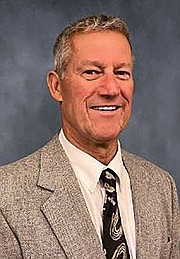Voting initiative sparks plenty of conversation
SANDPOINT — As voters consider upcoming elections, efforts to put a “top-four” open primary system on the ballot next year are sparking conversations throughout the political spectrum.
While statewide, there are Republican politicians like former Gov. Butch Otter who support the Open Primary Initiative, the reaction of Bonner County elected legislators is mixed. Those opposed include state Sen. Scott Herndon, District 1, who said the term “open primary” on the back of initiative clipboards is misleading
“The initiative is not actually for an open primary,” Herndon said. “Idaho used to have open primaries in the early 2000s until the Idaho Republican Party changed its rules and sued the state. A federal court enjoined Idaho from having open primaries on the basis of the First Amendment’s right of people to affiliate with a party and for the party to determine who its members are.”
Because voters would no longer be selecting party nominees, Herndon said the promoted process doesn’t meet the definition of an open primary. He cited many concerns with this system, highlighting that all four candidates that advance to a general election could be from the same party.
“There are rarely more than four people vying for an office in the May primary election,” he said. “In essence, one could argue that changing to a top-four primary eliminates the need for a primary election altogether. Since no political party nominees are chosen, the political parties become irrelevant, and the right of affiliation in the First Amendment is nullified.”
He also explained that many advantages of the current system would be lost, should the initiative be successful.
“One example is that in the current system if a nominee — after the May primary — withdraws, dies, or ceases to run for any reason, the party has an exclusive right to replace their nominee for the general election,” Herndon said. “This happened in the 2022 election cycle when Democrat Steven Scanlin was the May primary winner and Democratic nominee, and the party replaced him with Tom Arkoosh before the general election.”
A top-four primary system also eliminates assurance to general election voters that any vetting of party affiliation has occurred, he said. Because identifying with a party is not necessary to advance, there is little accountability for that individual to represent the candidate’s choice of party affiliation.
“Candidates will change party affiliation to what they think is most conducive and expedient to their success with the general election voters in November,” Herndon said.
He cited places like Boise, where it wouldn’t make sense for a candidate to run as an affiliation other than Democrat. In contrast, he said candidates in Bonner and Boundary counties would have no reason to identify as anything other than Republican on the general election ballot.
“The choice of party affiliation will be reduced to what candidates think is strategic to win voters,” Herndon said.
He also said ranked-choice voting, the second aspect of the initiative, will significantly compound the issue, saying an instant runoff scheme could even result in a first-round winner losing the general election.
“For example, FDR could receive 40% in the first round, Mao 31% and Stalin 29%,” Herndon said. “After Stalin is dropped out and his alternate votes redistributed, Mao could end up beating first-round winner FDR if FDR’s supporters were not willing to rank Mao or Stalin, but Stalin and Mao’s supporters were willing to compromise and rank other candidates except FDR.”
In a normal runoff, round one results could impact votes in a second round, an advantage that ranked choice and instant runoff can’t offer, Herndon said.
“Instant runoff voting does not grant to voters the ability to consider the new information of the results of previous rounds of voting before making a decision in the current round,” he said. “In this manner, ranked choice voting is fundamentally unfair to how humans make decisions.”
Herndon said he believes ranked-choice voting would also introduce two constitutional legal challenges: the redistricting commission that would be involved should the initiative pass and the requirement to trigger instant runoff.
The Idaho Constitution grants the ability to assign members of the redistricting commission to the two largest parties, he said. Without party nomination, the redistricting process isn’t able to faithfully be interpreted for the selection of redistricting commission members.
“This makes the provisions of the Constitution for the selection of the redistricting commission almost meaningless,” Herndon said.
The Idaho Constitution also states that the state’s executive officers like the governor, secretary of state, and attorney general win office when they receive the most votes in an election, he said.
“The ranked choice voting initiative exceeds the constitutional requirement and triggers instant runoffs until a majority is reached, which is a standard of 50% plus one and higher than the constitution requires,” Herndon said.
While some are against the initiative, other legislators said the issue is up to voters and encouraged them to take time to examine the pros and cons and decide for themselves how they want to choose their representation. State Rep. Mark Sauter, District 1A, said he believes the voting process is an area he chooses to remain neutral on because ultimately, voters should decide how they vote.
“My feeling is, if I'm going to be a representative, then let’s see what the people have to say — that’s my feeling on initiatives,” Sauter said. “People have a right to look into it and sign or not sign. So I’m not campaigning against it, or for it, really. I’m just trying to wait and see who falls in line with it.”
Sauter said these things take time, and observing which process results in accurate representation might mean trial and error.
“In a way I think it’s early in ranked-choice history to know if there really are any problems with it,” he said. “I know Alaska uses it and a number of states are trying it out. I’m not sure if it’s for us, but again, we’re going to sort this out over time. There’s time. I’m not sure this whole issue is really baked out yet.”
He clarified that this isn’t about not taking a stance, it’s about the nature of an initiative.
“I’m not really being wishy-washy, but I think this is the voters’ time to look at it and see what they think. The Legislature’s job is to deliberate. They did that with the education bill — some people liked it, some people didn’t. But ultimately, they deliberated and said this is the action that we should take.”
Signatures for the initiative will be collected until May 2024. If numbers meet requirements, the measure is expected to be placed on the ballot in November 2024 and implemented in 2026.


